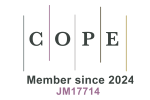Webinar series ‘How to conduct and publish excellent research on traffic safety’—part 5
The upcoming speaker is Lars Ekman, traffic safety expert at Swedish Transport Administration (recently retired).
Peer reviewing is an essential part of the publication process at the TSR, safeguarding the quality of the journal contents. It is performed jointly by a handling editor and external reviewers.
Based on the NISO's ‘Standard terminology for peer review’, the review process at the TSR can be described as:
After the submission, the following happens:
The submission can be rejected at any stage. The main bulk of rejections takes place during the editorial triage. Passing to the external review stage significantly improves the chances, yet does not guarantee the final acceptance decision.
The process starts with the editor-in-chief doing the initial screening and assigning a handling editor from the regular editorial team to handle the manuscript. Best attempt is made to match the submission subject to the core expertise of the editor. Occasionally, a guest editor is called for (e.g. when regular editors have competing interests).
The handling editor reads the submission and performs the editorial triage based on the quality criteria jointly developed and agreed on by the editorial team. The purpose of this procedure is to filter submissions that are unlikely to be accepted even with eventual revisions. The editorial triage saves external reviewers from reading and commenting on papers with low publication potential; it also allows the authors of rejected papers to quickly receive feedback and eventually resubmit their work elsewhere.
For a submission that passed the editorial triage, the handling editor may request minor changes before it is sent to external reviewers. It is also common that the handling editor provides own comments, acting de facto as an additional peer reviewer.
If a submission is rejected, the editor provides some motivation explaining the decision.
Manuscripts that passed editorial triage are sent to at least two independent external reviewers, experts in the subject. Based on reviewers' recommendations, the editor decides whether the manuscript should be Accepted, Revised, or Rejected. In case of doubts or contradicting reviews, the editor may approach an additional reviewer. The reviewers' comments are sent to the authors together with the editorial decision.
The handling editor has the facilitating role, but also the final decision power. He/she may override some of the reviewer's recommendations. Neither is there an ambition to force the authors to strictly follow each of the reviewers' suggestions; rather, the general spirit of improving the scientific quality by taking into consideration constructive comments from peers is pursued.
The detailed instructions provided to the external reviewers can be found here. The handling editor is considered to be a part of the reviewing process, thus the ethical guidelines for reviewers (competing interests, confidentiality, accountability, etc.) apply to the editor to the same extent.
The TSR aims at the final decision to be taken after the first round of revisions. It is expected that by then it becomes evident for the editor whether the paper is ‘publishable in general’ (despite minor imperfections) or it is not likely to ever improve to meet the quality standards of the journal. In both cases, little is to be gained by extending the process with additional review rounds. In rare cases, for example if substantial changes have been made to the original text, the second review round might be motivated.
Published papers reveal the names of the handling editor and the reviewers. If a paper is accepted against the recommendation of a reviewer, his/her name is not disclosed. Neither are revealed the names of the reviewers for the papers that have been rejected.
In case the authors suspect some misconduct during the reviewing process or disagree with the editor's decision, they may lodge an appeal and request the situation to be investigated. Read more about the procedures for complaints and appeals here.
The upcoming speaker is Lars Ekman, traffic safety expert at Swedish Transport Administration (recently retired).
|
ISSN 2004-3082 (online) Editor-in-chief: |
 |
